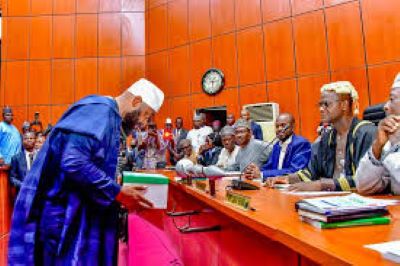Governor Mohammed Umaru Bago of Niger State has presented the 2025 Appropriation Bill tagged “Budget of Hope for Sustainability and Food Security” to the State House of Assembly. The budget, valued at N1.558 trillion, prioritizes agriculture, which received the highest allocation of N399 billion.
During the presentation on Thursday, December 12, 2024, at the Assembly Complex in Minna, Bago emphasized the need to strengthen the foundation for socio-economic development and food security under the New Niger Agenda. He noted that the 2025 budget represents a 48.32% increase from the 2024 appropriation.
Revenue and expenditure breakdown
The budget comprises N196.3 billion for recurrent expenditure and N1.36 trillion for capital projects, representing 87% of the total allocation. Projected revenue sources include statutory allocations, internally generated revenue (IGR), and capital receipts.
Key revenue assumptions for 2025 include an annual agricultural income of N106.37 billion, N50 billion from solid minerals, and an exchange rate benchmark of N1,500 per USD.
Sectoral allocations
Agriculture: The sector will benefit from investments worth N399 billion, including N314 billion from international partners for agro-industrial processing and N9.8 billion for livestock development.
Infrastructure: N437 billion is allocated for road projects, including N49.5 billion for roads connecting Matachibu, Bangi, and Kanpani Bobi. Over N100 billion is earmarked for the Minna Phase I & II road projects.
Health: 100 Level 2 primary healthcare centres are under construction, and additional funds are being used for health insurance enrollment and the renovation of the IBB Specialist Hospital.
Education: N450 million in scholarships was awarded to 8,418 students in 2024, with plans to renovate and construct 600 secondary schools in 2025.
Transportation: N10 billion is allocated for modern bus terminals and compressed natural gas (CNG) stations, alongside N29 billion for trailer parks.
Rural Development: N4.6 billion will support community-driven projects under the Ward Development Project.
Emphasis on sustainability
Governor Bago stressed the administration’s commitment to participatory governance, transparency, and inclusivity in the budget planning process. The 2025 budget, he said, is tailored to address development challenges while creating economic opportunities across the state.
Looking ahead
With agriculture as the linchpin of the state’s development strategy, Governor Bago highlighted plans to harness Niger State’s comparative advantage to ensure food security, create jobs, and generate revenue. The budget aims to consolidate progress made in 2024 and propel Niger State toward sustainable growth.


